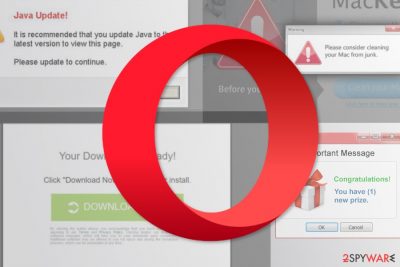Opera redirect virus (Removal Guide) - Updated Guide
Opera redirect virus Removal Guide
What is Opera redirect virus?
Opera redirect virus is a set of potentially malicious applications that could lead to severe consequences

Opera redirect virus is a phrase used to describe a variety of potentially unwanted programs related to the Opera web browser. They can range from browser hijackers to adware. PUPs usually infiltrate the device with the help of software bundling or are manually installed by the user from a deceptive site. Upon infiltration, Opera virus can make a lot of significant changes to the browser or/and the system. Even though constant pop-up ads cause immense frustration to users, the biggest danger lies in potential malware infections that could consequently lead to computer inclusion into a botnet, crypto-mining, sensitive data gathering, and similar privacy issues. Recently, users have been complaining about their browser redirecting them to redirector.opera.com and its subdomains, which is most likely linked to adware infection.
| Summary | |
| Name | Opera redirect virus |
| Type | Potentially unwanted programs/malware |
| Compatible with | Windows, Mac OS X, Linux operating system |
| Vulnerable browser | Opera |
| Infiltration | Software bundling, browser vulnerabilities, deceptive websites, etc. |
| Symptoms | Altered homepage and search engine, sponsored links, persistent pop-up ads, and redirects, etc. |
| Main dangers | Severe malware infections, sensitive information leak |
| Elimination | You can get rid of potentially unwanted programs, you can make use anti-malware software that detects PUPs. However, you can eliminate most of the suspicious apps manually – we explain below how |
| Optimization | If you noticed that your computer is crashing, lagging, or is suffering from other stability issues, you can fix them with the help of FortectIntego |
Opera web browser is compatible with Windows, macOS and Linux operating systems.[1] It is one of the oldest browsers that is is still relatively popular, so there is no surprise that crooks target its users. Also, the unwanted programs seem to be targeting Opera browsers exclusively while skipping Google Chrome, Internet Explorer, Mozilla Firefox, and Safari – hence the Opera virus name.
Opera browser hijack symptoms are as follows:
- altered homepage, default search engine, and new tab;
- redirects to suspicious websites during a web search, clicking links, or visiting random websites;
- an increased amount of ads or pop-ups;
- an appearance of unknown browser extensions, add-ons, or toolbars.
Opera redirect virus is similar to Chrome, Firefox or IE redirect viruses. The purpose of the infection is to force the user’s browser to open new tabs and trigger visits to affiliate websites. In various forums,[2] users report about being redirected to travel, music, gaming, and similar sites. Undoubtedly, this activity is annoying and diminishes browsing experience significantly.
Opera redirect problems might end up worse than expected. Some PUPs initiate redirects to potentially dangerous websites. For instance, you might end up on a tech support scam or phishing[3] site where cyber criminals hope to obtain your personal information. Furthermore, you might be forced to visit a domain where malicious JavaScript[4] code could use a flaw in the unpatched software to inject malware.

Moreover, some versions of Opera redirect malware might also display pop-ups and ads that are misleading. They might promote bogus security software, notify about available updates or warn about the alleged virus attack. However, you should never click these advertisements because they are most likely to infect you with a trojan.
Therefore, if you have noticed suspicious activities on Opera, such as redirects, changed homepage, etc., you should take care of your computer’s security. We firmly recommend installing anti-spyware or anti-malware to clean your device from potentially unwanted programs such as Opera virus and all additional content that has been brought by it. Also, after termination, you could use FortectIntego to remediate your system and ensure it runs as before.
A manual Opera redirect virus removal option is also available. However, it might be a complicated task because it’s hard to tell what program is responsible for the infection. But if you want to try to find and locate malicious components, you should not forget to check opera://extensions page and uninstall unknown add-ons.
However, sometimes Opera redirect problem is related to the browser’s settings itself. Therefore, you can check if “Enable automatic redirection” option is checked or not. You can do it by following this path: Settings > Preferences > Advanced > Network > uncheck “Enable automatic redirection.”
Redirector.opera.com – a deceptive redirect virus
Users recently reported a spike of Redirector.opera.com redirects on Opera web browser. Just as most potentially unwanted applications, it gets installed together with shareware and freeware programs, although users might install questionable applications like system optimizers and similar useless software after being tricked by clever social engineering.
Those who have their browsers affected by Redirector.opera.com can expect a large number of pop-ups, banners, deals, offers, in-text links, during their browser sessions. Additionally, these disturbances can also show up when Opera is not in operation. For that reason, Redirector.opera.com removal becomes necessary.
If you notice pop-up ads that are marked by Redirector.opera.com, you need to eliminate the adware that is associated with the redirect. Please use our instructions below for that.

Dissemination methods of the redirect malware
Potentially unwanted programs that are responsible for Opera redirects to sponsored websites usually spread attached in software packages. Security experts from Poland[5] tell that proper installation of programs is necessary to avoid accidental installation of PUPs:
- Download programs from reliable websites only. Avoid file-sharing sites and rely on the official trusted developers' sites.
- Always opt for the Advanced/Custom installation method instead of Quick/Standard/Recommended. The latter settings rarely disclose about third-party apps that are included in the package. Thus, using this setup, you give indirect permission to install them without even realizing it.
- Read the Terms of Use and other official documents before clicking “Agree” button.
- Unmark all pre-selected additional apps or agreements to change your current search engine with an unknown provider.
However, PUPs often are presented as useful browser add-ons, extensions, or programs. Sometimes, they pretend to be updated for popular applications, such as Adobe Flash Player.[6] Therefore, you should never forget that reminders to install available updates popped up in the form of ads are fake, and you should not click them.
Eliminate Opera redirect virus
As you already know, redirects are initiated by a potentially unwanted program, usually a browser hijacker, such as Opera virus. Therefore, in order to stop this activity, you have to find and remove the source of the problem – PUP. For that, you have two options – manual and automatic elimination.
In order to remove Opera redirect virus manually, you have to investigate the system attentively. You have to find unknown programs installed on your computer and check the list of Opera extensions. The instructions below will give you more details on where to look up for hijacker-related entries.
However, some hijackers do not contain any files. It means that you will not be able to find and delete the PUP manually. For this reason, you will have to opt for an automatic Opera redirect virus removal option. Bear in mind that you have to run a full system scan with a professional and up-to-date anti-malware or anti-spyware.
You may remove virus damage with a help of FortectIntego. SpyHunter 5Combo Cleaner and Malwarebytes are recommended to detect potentially unwanted programs and viruses with all their files and registry entries that are related to them.
Getting rid of Opera redirect virus. Follow these steps
Uninstall from Windows
If you are suffering from Opera redirects, you have to check if any unknown programs haven't been installed on your computer. The instructions below will show you how to achieve this goal.
If you cannot find any programs, you have to Opera's extensions and lookup for the hijacker there. You can access the list of installed add-ons following this address: opera://extensions page.
If you find unknown extensions, uninstall them ASAP. Then reset the browser:
- Open Opera and access About Opera page.
- Under the Path section select Profile and copy the address.
- Open File Explorer and paste the copied address.
- Click on Opera Software folder. Here you will find the Opera Stable folder. Delete it.
- Close the browser.
Instructions for Windows 10/8 machines:
- Enter Control Panel into Windows search box and hit Enter or click on the search result.
- Under Programs, select Uninstall a program.

- From the list, find the entry of the suspicious program.
- Right-click on the application and select Uninstall.
- If User Account Control shows up, click Yes.
- Wait till uninstallation process is complete and click OK.

If you are Windows 7/XP user, proceed with the following instructions:
- Click on Windows Start > Control Panel located on the right pane (if you are Windows XP user, click on Add/Remove Programs).
- In Control Panel, select Programs > Uninstall a program.

- Pick the unwanted application by clicking on it once.
- At the top, click Uninstall/Change.
- In the confirmation prompt, pick Yes.
- Click OK once the removal process is finished.
Delete from macOS
First of all, you have to follow the instructions below to get rid of suspicious applications that may have been installed on your Mac silently. Then, check the list of Opera's extensions and uninstall unknown add-ons, extensions, toolbars, or similar entries.
When all potentially dangerous entries are wiped out, you have to clean install Oper. Before that, we recommend backing up all bookmarks and other necessary information because it would be lost.
- Uninstall Opera as an ordinary application from your Mac.
- Then delete Opera profile data.
- Go to the official Opera's website and download the latest version of the browser.
- Follow the installation guidelines.
Remove items from Applications folder:
- From the menu bar, select Go > Applications.
- In the Applications folder, look for all related entries.
- Click on the app and drag it to Trash (or right-click and pick Move to Trash)

To fully remove an unwanted app, you need to access Application Support, LaunchAgents, and LaunchDaemons folders and delete relevant files:
- Select Go > Go to Folder.
- Enter /Library/Application Support and click Go or press Enter.
- In the Application Support folder, look for any dubious entries and then delete them.
- Now enter /Library/LaunchAgents and /Library/LaunchDaemons folders the same way and terminate all the related .plist files.

After uninstalling this potentially unwanted program (PUP) and fixing each of your web browsers, we recommend you to scan your PC system with a reputable anti-spyware. This will help you to get rid of Opera redirect registry traces and will also identify related parasites or possible malware infections on your computer. For that you can use our top-rated malware remover: FortectIntego, SpyHunter 5Combo Cleaner or Malwarebytes.
How to prevent from getting browser hijacker
Protect your privacy – employ a VPN
There are several ways how to make your online time more private – you can access an incognito tab. However, there is no secret that even in this mode, you are tracked for advertising purposes. There is a way to add an extra layer of protection and create a completely anonymous web browsing practice with the help of Private Internet Access VPN. This software reroutes traffic through different servers, thus leaving your IP address and geolocation in disguise. Besides, it is based on a strict no-log policy, meaning that no data will be recorded, leaked, and available for both first and third parties. The combination of a secure web browser and Private Internet Access VPN will let you browse the Internet without a feeling of being spied or targeted by criminals.
No backups? No problem. Use a data recovery tool
If you wonder how data loss can occur, you should not look any further for answers – human errors, malware attacks, hardware failures, power cuts, natural disasters, or even simple negligence. In some cases, lost files are extremely important, and many straight out panic when such an unfortunate course of events happen. Due to this, you should always ensure that you prepare proper data backups on a regular basis.
If you were caught by surprise and did not have any backups to restore your files from, not everything is lost. Data Recovery Pro is one of the leading file recovery solutions you can find on the market – it is likely to restore even lost emails or data located on an external device.
- ^ Opera (web browser). Wikipedia. The free encyclopedia.
- ^ Adware(Malware) attack.... Opera. Official forums.
- ^ What is phishing?. PhishTank. The website about phishing.
- ^ Ebubekir Büber. How Companies Are Hacked via Malicious Javascript Code?. ITNEXT. Building IT together.
- ^ UsunWirusa. UsunWirusa. Polish security and spyware news.
- ^ Margaret Rouse. Adobe Flash Player. Search Security. Tech Target.





